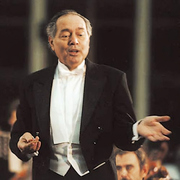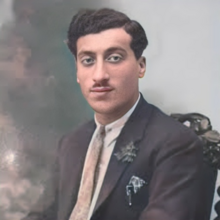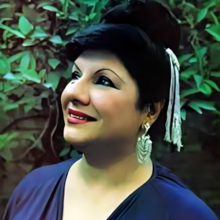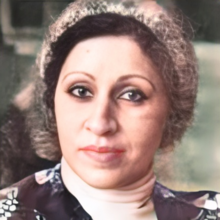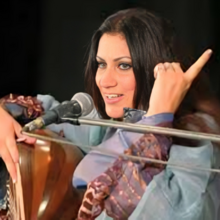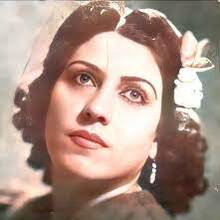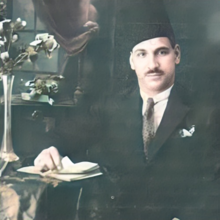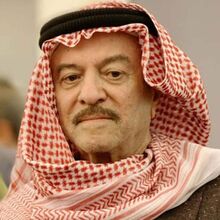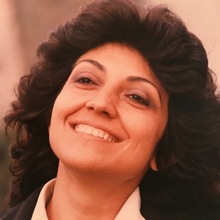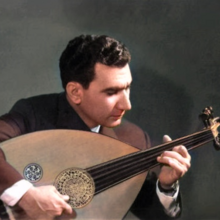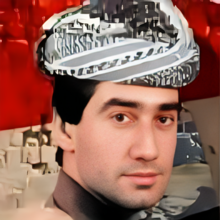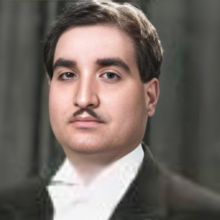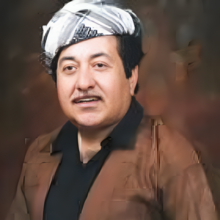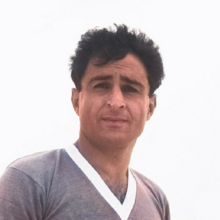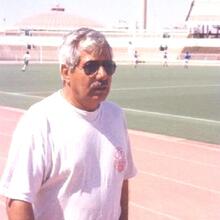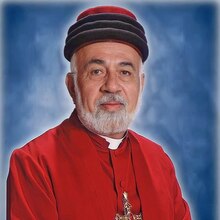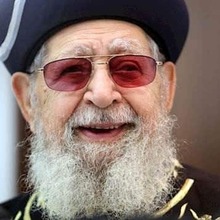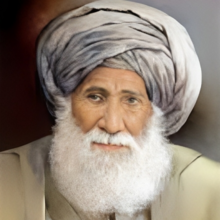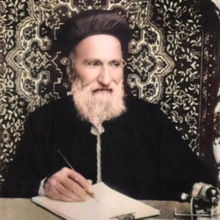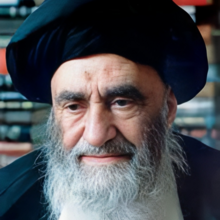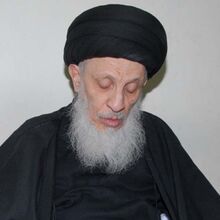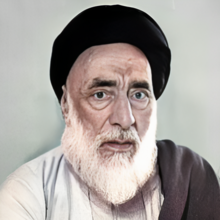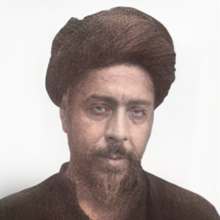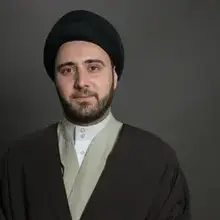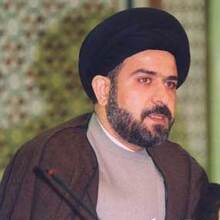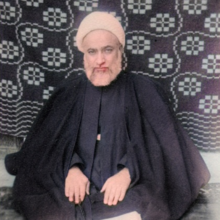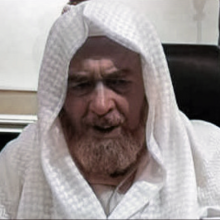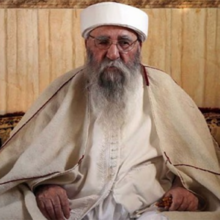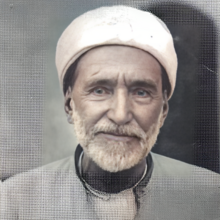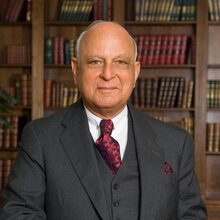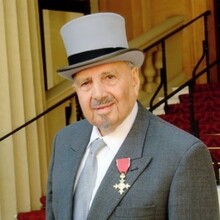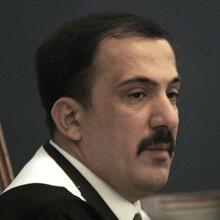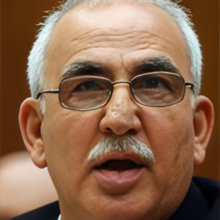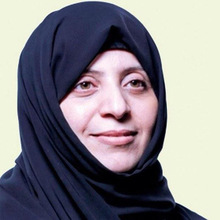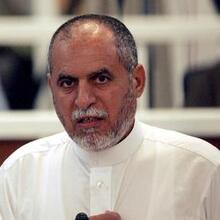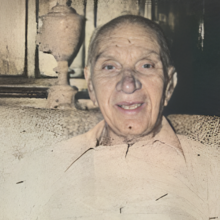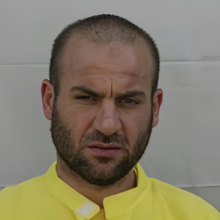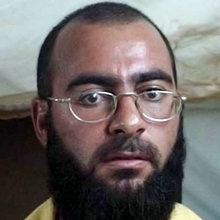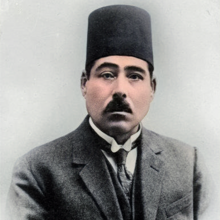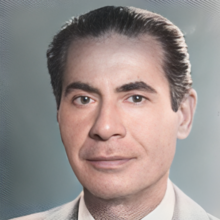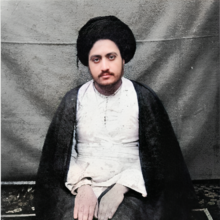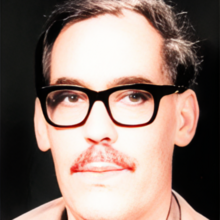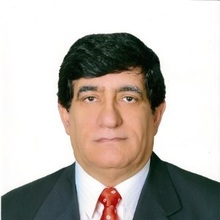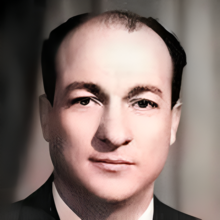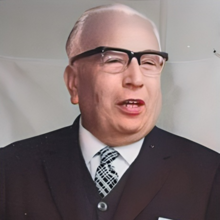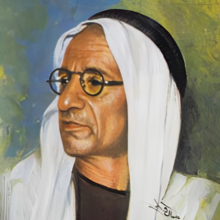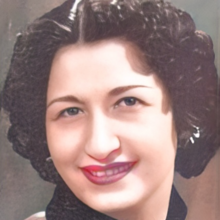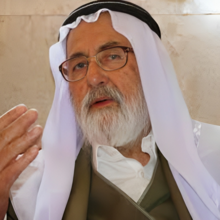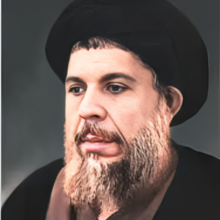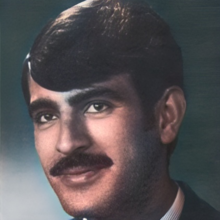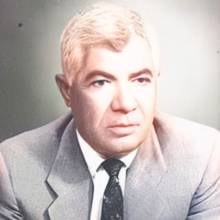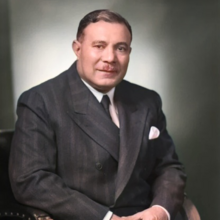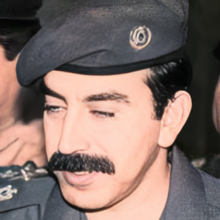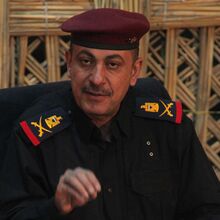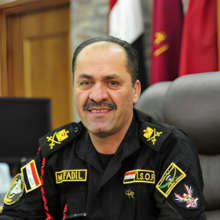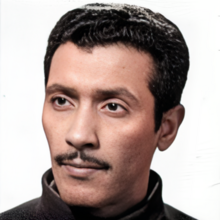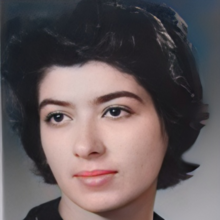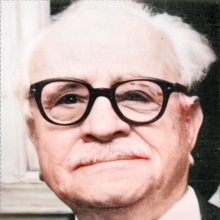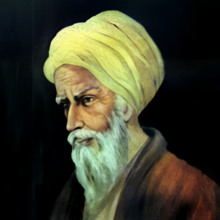 Jawad Saleem
1919 - 1961
Director of Iraq National Museum
Jawad Saleem
1919 - 1961
Director of Iraq National Museum
 Shakir Hassan Al Said
1925 - 2004
Painter, sculptor and writer
Shakir Hassan Al Said
1925 - 2004
Painter, sculptor and writer
 Abu Mansur al Baghdadi
980 - 1037
Shafi'i scholar and mathematician
Abu Mansur al Baghdadi
980 - 1037
Shafi'i scholar and mathematician
 Fadhil Barwari
1950 - 2021
general and liaison with UN weapons inspectors
Fadhil Barwari
1950 - 2021
general and liaison with UN weapons inspectors
 Anne Nafi Aussi
1964 - 2018
Painter and sculptor
Anne Nafi Aussi
1964 - 2018
Painter and sculptor
 Qays Abd al Hussein al Yasiri
1941 - 1995
Founder of modern Iraqi sociology
Qays Abd al Hussein al Yasiri
1941 - 1995
Founder of modern Iraqi sociology
 Naim Dangoor
1914 - 2015
Founder of The Exilarch's Foundation
Naim Dangoor
1914 - 2015
Founder of The Exilarch's Foundation
 Samira Saleh Ali al Naimi
1963 - 2014
Human rights defender
Samira Saleh Ali al Naimi
1963 - 2014
Human rights defender
 Emmanuel III Delly
1927 - 2014
Patriarch of Babylon of the Chaldeans
Emmanuel III Delly
1927 - 2014
Patriarch of Babylon of the Chaldeans
 Talib Al Naqib
1862 - 1929
Prime Minister of Iraq
Talib Al Naqib
1862 - 1929
Prime Minister of Iraq
 Ovadia Yosef
1920 - 2013
Sephardi Chief Rabbi of Israel
Ovadia Yosef
1920 - 2013
Sephardi Chief Rabbi of Israel
 Arshad al Umari
1913 - 1973
Prime Minister of Iraq
Arshad al Umari
1913 - 1973
Prime Minister of Iraq
 Mulla Effendi
1778 - 1855
Islamic scholar and astronomer
Mulla Effendi
1778 - 1855
Islamic scholar and astronomer
 Abdul Salam Arif
1921 - 1966
President of Iraq
Abdul Salam Arif
1921 - 1966
President of Iraq
 Moshe Barazani
1926 - 1947
Member of Lehi underground movement
Moshe Barazani
1926 - 1947
Member of Lehi underground movement
 Abd al Rahman al Bazzaz
1913 - 1973
Prime Minister of Iraq
Abd al Rahman al Bazzaz
1913 - 1973
Prime Minister of Iraq
 Nemir Kirdar
1936 - 2020
Founder and CEO of Investcorp
Nemir Kirdar
1936 - 2020
Founder and CEO of Investcorp
 Abu'l-Hasan al-Uqlidisi
920 - 980
Author of Kitab al-Fusul fi al-Hisab al-Hindi
Abu'l-Hasan al-Uqlidisi
920 - 980
Author of Kitab al-Fusul fi al-Hisab al-Hindi
 Shaalan Abu al Jun
1864 - 1941
activist for Iraqi independence and Arab culture
Shaalan Abu al Jun
1864 - 1941
activist for Iraqi independence and Arab culture
 Abdulahad AbdulNour
1889 - 1945
Leader of the Golden Square group
Abdulahad AbdulNour
1889 - 1945
Leader of the Golden Square group
 Yasin al Hashimi
1884 - 1937
Prime Minister of Iraq
Yasin al Hashimi
1884 - 1937
Prime Minister of Iraq
 Ghazi of Iraq
1912 - 1939
King of Iraq
Ghazi of Iraq
1912 - 1939
King of Iraq
 Shahab ud Din Mar ashi Najafi
1897 - 1990
Shia jurist and marja'
Shahab ud Din Mar ashi Najafi
1897 - 1990
Shia jurist and marja'
 Muhammad Najib ar Rubai
1904 - 1965
President of Iraq
Muhammad Najib ar Rubai
1904 - 1965
President of Iraq
 Bahija Khalil Ismail
1934 - 2019
Assyriologist and director of the Iraq Museum
Bahija Khalil Ismail
1934 - 2019
Assyriologist and director of the Iraq Museum
 Mulla Sadra
1571 - 1640
Founder of Transcendent Theosophy
Mulla Sadra
1571 - 1640
Founder of Transcendent Theosophy
 Abdul Majid al Khoei
1962 - 2003
Shia cleric and activist
Abdul Majid al Khoei
1962 - 2003
Shia cleric and activist
 Muhammad Taha al Huwayzi
1899 - 1968
Islamic scholar and astronomer
Muhammad Taha al Huwayzi
1899 - 1968
Islamic scholar and astronomer
 Emad Zaki Yehya
1955 - 2016
Petroleum consultant, author, professor
Emad Zaki Yehya
1955 - 2016
Petroleum consultant, author, professor
 Ahmad al Safi al Najafi
1897 - 1977
Poet ,activist for Iraqi independence
Ahmad al Safi al Najafi
1897 - 1977
Poet ,activist for Iraqi independence
 Khalil Dabbagh
1916 - 1969
Overthrowing the Iraqi monarchy
Khalil Dabbagh
1916 - 1969
Overthrowing the Iraqi monarchy
 Tahir Allauddin Al Qadri Al Gillani
980 - 1037
Shafi'i scholar and mathematician
Tahir Allauddin Al Qadri Al Gillani
980 - 1037
Shafi'i scholar and mathematician
 Musa al Musawi
1930 - 1997
Founder of modern Iraqi sociology
Musa al Musawi
1930 - 1997
Founder of modern Iraqi sociology
 George Ovadiah
1925 - 1996
Bourekas film director, producer and scriptwriter
George Ovadiah
1925 - 1996
Bourekas film director, producer and scriptwriter
 Abdul Karim Qasim
1914 - 1963
Overthrowing the Iraqi monarchy
Abdul Karim Qasim
1914 - 1963
Overthrowing the Iraqi monarchy
 Yosef Hayyim
1834 - 1909
Halakhic authority and master of mysticism
Yosef Hayyim
1834 - 1909
Halakhic authority and master of mysticism
 Hafidh al-Droubi
1914 - 1991
Modernizing Iraqi architecture and urbanism
Hafidh al-Droubi
1914 - 1991
Modernizing Iraqi architecture and urbanism
 Farhat Ezekiel Nadira
1932 - 2006
Playing seductive and glamorous roles
Farhat Ezekiel Nadira
1932 - 2006
Playing seductive and glamorous roles
 Jamil Sidqi al Zahawi
1863 - 1936
Poet, philosopher, professor, critic
Jamil Sidqi al Zahawi
1863 - 1936
Poet, philosopher, professor, critic
 Menahem Saleh Daniel
1846 - 1940
Businessman, landowner, philanthropist
Menahem Saleh Daniel
1846 - 1940
Businessman, landowner, philanthropist
 Muhammad Saeed al Hakim
1936 - 2021
Shia marja
Muhammad Saeed al Hakim
1936 - 2021
Shia marja
 Murad al Daghistani
1917 - 1982
Documenting the modernization
Murad al Daghistani
1917 - 1982
Documenting the modernization
 Ibn al Haytham
965 - 1040
Father of modern optics and pioneer of scientific
Ibn al Haytham
965 - 1040
Father of modern optics and pioneer of scientific
 Layla Al Attar
1944 - 1993
Director of Iraq National Art Museum
Layla Al Attar
1944 - 1993
Director of Iraq National Art Museum
 Abd al Muhsin as Sa dun
1883 - 1936
Prime Minister of Iraq
Abd al Muhsin as Sa dun
1883 - 1936
Prime Minister of Iraq
 Dilshad Meriwani
1947 - 1989
Poet and activist for Kurdish language and culture
Dilshad Meriwani
1947 - 1989
Poet and activist for Kurdish language and culture
 Foulath Hadid
1937 - 2012
Writer and expert on Arab affairs
Foulath Hadid
1937 - 2012
Writer and expert on Arab affairs
 Lamia Al Gailani Werr
1938 - 2019
Archaeologist and museum curator
Lamia Al Gailani Werr
1938 - 2019
Archaeologist and museum curator
 Yusuf Zaarur
1902 - 1969
Qanun player, director of Radio Orchestra
Yusuf Zaarur
1902 - 1969
Qanun player, director of Radio Orchestra
 Raphael I Bidawid
1922 - 2003
Patriarch of Babylon of the Chaldeans
Raphael I Bidawid
1922 - 2003
Patriarch of Babylon of the Chaldeans
 Alexander the Great
-356 - -323
King of Macedon and Hegemon of the Hellenic League
Alexander the Great
-356 - -323
King of Macedon and Hegemon of the Hellenic League
 Thabit AbdulNour
1890 - 1945
Leader of the Golden Square group
Thabit AbdulNour
1890 - 1945
Leader of the Golden Square group
 Subhi al Badri al Samerai
1936 - 2013
Islamic scholar and astronomer
Subhi al Badri al Samerai
1936 - 2013
Islamic scholar and astronomer
 Muhammad Anvari
1126 - 1189
Poet, philosopher, alchemist, polymath
Muhammad Anvari
1126 - 1189
Poet, philosopher, alchemist, polymath
 Yusuf Salman Yusuf
1901 - 1949
First secretary of the Iraqi Communist Party
Yusuf Salman Yusuf
1901 - 1949
First secretary of the Iraqi Communist Party
 Mohammed Taki Mehdi
1928 - 1998
Activist, writer, pro-Palestinian leader
Mohammed Taki Mehdi
1928 - 1998
Activist, writer, pro-Palestinian leader
 Shafiq Ades
1900 - 1948
Ford car company agency in Iraq
Shafiq Ades
1900 - 1948
Ford car company agency in Iraq
 Faisal I of Iraq
1885 - 1933
King of Iraq and Syria
Faisal I of Iraq
1885 - 1933
King of Iraq and Syria
 Abo of Tiflis
756 - 786
Perfumer and Christian convert
Abo of Tiflis
756 - 786
Perfumer and Christian convert
 Donny George Youkhanna
1950 - 2011
Director of Iraq National Museum
Donny George Youkhanna
1950 - 2011
Director of Iraq National Museum
 Eyaz Zaxoyi
1961 - 1986
Kurdish maqam singer
Eyaz Zaxoyi
1961 - 1986
Kurdish maqam singer
 Hayat Sharara
1935 - 1997
Iraqi writer, translator and educator
Hayat Sharara
1935 - 1997
Iraqi writer, translator and educator
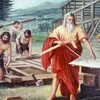 Noah
-4500 - -3550
Noah
-4500 - -3550
 Nebuchadnezzar II
-630 - -561
king of Babylonia
Nebuchadnezzar II
-630 - -561
king of Babylonia
 Abdul Qadir Al Rassam
1882 - 1952
Painter and sculptor
Abdul Qadir Al Rassam
1882 - 1952
Painter and sculptor
 Mohammad Baqir al Hakim
1939 - 2003
Leader of the Supreme Council
Mohammad Baqir al Hakim
1939 - 2003
Leader of the Supreme Council
 Haydar al Sadr
1891 - 1937
Islamic scholar and astronomer
Haydar al Sadr
1891 - 1937
Islamic scholar and astronomer
 Yitzhak Nissim
1896 - 1981
Sephardic Chief Rabbi of Israel
Yitzhak Nissim
1896 - 1981
Sephardic Chief Rabbi of Israel
 Sharif Ali bin al Hussein
1956 - 2022
Leader of the Iraqi Constitutional Monarchy party
Sharif Ali bin al Hussein
1956 - 2022
Leader of the Iraqi Constitutional Monarchy party
 Ezra Dangoor
1848 - 1930
Chief Rabbi of Baghdad and founder
Ezra Dangoor
1848 - 1930
Chief Rabbi of Baghdad and founder
 Mohamed Makiya
1914 - 2015
Founder of Iraq's first department of architecture
Mohamed Makiya
1914 - 2015
Founder of Iraq's first department of architecture
 Muhammad Fadhel al Jamali
1856 - 1913
Ottoman generalissimo and grand vizier
Muhammad Fadhel al Jamali
1856 - 1913
Ottoman generalissimo and grand vizier
 Awad Hamed al Bandar
1945 - 2007
Head of the Revolutionary Court for Dujail
Awad Hamed al Bandar
1945 - 2007
Head of the Revolutionary Court for Dujail
 Armand Nassery
1966 - 2017
Author, filmmaker, former Zionist
Armand Nassery
1966 - 2017
Author, filmmaker, former Zionist
 Abdul Aziz al Hakim
1953 - 2009
Leader of Islamic Supreme Council of Iraq
Abdul Aziz al Hakim
1953 - 2009
Leader of Islamic Supreme Council of Iraq
 Ahmed Hassan al Bakr
1914 - 1982
President of Iraq
Ahmed Hassan al Bakr
1914 - 1982
President of Iraq
 Hagop Hagopian
1951 - 1988
Founder and leader of ASALA
Hagop Hagopian
1951 - 1988
Founder and leader of ASALA
 Naziha Salim
1927 - 2008
Painter and writer
Naziha Salim
1927 - 2008
Painter and writer
 Louis Cheikho
1859 - 1927
Jesuit, historian and Arabist
Louis Cheikho
1859 - 1927
Jesuit, historian and Arabist
 Zaha Hadid
1950 - 2016
Pioneering deconstructivist architecture
Zaha Hadid
1950 - 2016
Pioneering deconstructivist architecture
 Ismail Fatah Al Turk
1934 - 2004
Painter and sculptor
Ismail Fatah Al Turk
1934 - 2004
Painter and sculptor
 Abu al-Mughith al-Husayn ibn Mansur al-Hallaj
858 - 922
Mystic, poet, teacher of Sufism
Abu al-Mughith al-Husayn ibn Mansur al-Hallaj
858 - 922
Mystic, poet, teacher of Sufism
 Jabir ibn Hayyan
721 - 815
Alchemist and philosopher
Jabir ibn Hayyan
721 - 815
Alchemist and philosopher
 Abdallah Somekh
1813 - 1889
Rosh yeshiva and posek of Iraqi Jewry
Abdallah Somekh
1813 - 1889
Rosh yeshiva and posek of Iraqi Jewry
 Abd alnHusayn Sharaf al Din al Musawi
1872 - 1957
Shia scholar and reformer
Abd alnHusayn Sharaf al Din al Musawi
1872 - 1957
Shia scholar and reformer
 Mohammad al Sadr
1882 - 1956
Prime Minister of Iraq from 1948 to 1948
Mohammad al Sadr
1882 - 1956
Prime Minister of Iraq from 1948 to 1948
 Hashem Muhammad al Baghdadi
1917 - 1973
Documenting the modernization
Hashem Muhammad al Baghdadi
1917 - 1973
Documenting the modernization
 Hisham al Hashimi
1973 - 2020
Researcher and expert on armed groups
Hisham al Hashimi
1973 - 2020
Researcher and expert on armed groups
 Ignatius Zakka I
1933 - 2014
Patriarch of Antioch and head
Ignatius Zakka I
1933 - 2014
Patriarch of Antioch and head
 Mohammad Taqi al Khoei
1954 - 1994
Shia scholar and philanthropist
Mohammad Taqi al Khoei
1954 - 1994
Shia scholar and philanthropist
 Mar Dinkha IV
1935 - 2015
Catholicos-Patriarch of the Assyrian Church
Mar Dinkha IV
1935 - 2015
Catholicos-Patriarch of the Assyrian Church
 Taha Baqir
1912 - 1984
Director of Iraq National Museum
Taha Baqir
1912 - 1984
Director of Iraq National Museum
 Ali Merdan
1904 - 1981
Musician and singer of Kurdish songs
Ali Merdan
1904 - 1981
Musician and singer of Kurdish songs
 Sultan Hashim Ahmad al Tai
1945 - 2010
Minister of Defense and Interior
Sultan Hashim Ahmad al Tai
1945 - 2010
Minister of Defense and Interior
 Safa Khulusi
1917 - 1995
Scholar of modern Iraqi literature
Safa Khulusi
1917 - 1995
Scholar of modern Iraqi literature
 Ahlam Wehbi
1938 - 2020
Singer and actress
Ahlam Wehbi
1938 - 2020
Singer and actress
 Hussein Kamel al Majid
1954 - 1966
President of Iraq
Hussein Kamel al Majid
1954 - 1966
President of Iraq
 Abu Nuwas
756 - 814
Poet, satirist, courtier of the Abbasid caliphate
Abu Nuwas
756 - 814
Poet, satirist, courtier of the Abbasid caliphate
 Khamis al Obeidi
1966 - 2006
Defence lawyer for Saddam Hussein
Khamis al Obeidi
1966 - 2006
Defence lawyer for Saddam Hussein
 Toma Tomas
1924 - 1945
Leader of the Golden Square group
Toma Tomas
1924 - 1945
Leader of the Golden Square group
 Rashid Yassin
1931 - 2012
Iraqi journalist, poet, literary critic
Rashid Yassin
1931 - 2012
Iraqi journalist, poet, literary critic
 Salih Jabr
1896 - 1957
Prime Minister of Iraq from 1947 to 1948
Salih Jabr
1896 - 1957
Prime Minister of Iraq from 1947 to 1948
 Abd al Ilah
1913 - 1958
Regent and Crown Prince of Iraq
Abd al Ilah
1913 - 1958
Regent and Crown Prince of Iraq
 Ali Jawdat al Aiyubi
1913 - 1969
Prime Minister of Iraq
Ali Jawdat al Aiyubi
1913 - 1969
Prime Minister of Iraq
 Jafar al Askari
1885 - 1936
Minister of Defense and Interior of Iraq
Jafar al Askari
1885 - 1936
Minister of Defense and Interior of Iraq
 Maruf al Rusafi
1875 - 1945
Neo-classical Arabic poet
Maruf al Rusafi
1875 - 1945
Neo-classical Arabic poet
 Saib Shawkat
1898 - 1984
Dean of the Iraqi Royal College of Medicine
Saib Shawkat
1898 - 1984
Dean of the Iraqi Royal College of Medicine
 Nuha al Radi
1941 - 2004
Ceramicist and painter
Nuha al Radi
1941 - 2004
Ceramicist and painter
 Ignatius Aphrem I Barsoum
1887 - 1957
Patriarch of Antioch and head
Ignatius Aphrem I Barsoum
1887 - 1957
Patriarch of Antioch and head
 Saddam Hussein
1937 - 2006
Ruling Iraq with an iron fist from 1979 to 2003
Saddam Hussein
1937 - 2006
Ruling Iraq with an iron fist from 1979 to 2003
 Tawfiq al Suwaidi
1892 - 1968
Prime Minister of Iraq
Tawfiq al Suwaidi
1892 - 1968
Prime Minister of Iraq
 Naim Kattan
1928 - 2021
Novelist, essayist and critic
Naim Kattan
1928 - 2021
Novelist, essayist and critic
 Shimon Agassi
1852 - 1914
Patriarch of Antioch
Shimon Agassi
1852 - 1914
Patriarch of Antioch
 Paul II Cheikho
1906 - 1989
Patriarch of Babylon of the Chaldeans
Paul II Cheikho
1906 - 1989
Patriarch of Babylon of the Chaldeans
 Sabah Al Fatlawi
1950 - 2018
Iraqi general
Sabah Al Fatlawi
1950 - 2018
Iraqi general
 Nuri al Said
1888 - 1958
Prime Minister of Iraq
Nuri al Said
1888 - 1958
Prime Minister of Iraq
 Ignatius Peter IV
1798 - 1894
Patriarch of Antioch and head
Ignatius Peter IV
1798 - 1894
Patriarch of Antioch and head
 Ammo Baba
1934 - 2009
Iraq national football team manager
Ammo Baba
1934 - 2009
Iraq national football team manager
 Naziha al Dulaimi
1923 - 2007
founder and first president of the Iraqi Women's
Naziha al Dulaimi
1923 - 2007
founder and first president of the Iraqi Women's
 Khurto Hajji Ismail
1933 - 1855
Islamic scholar and astronomer
Khurto Hajji Ismail
1933 - 1855
Islamic scholar and astronomer
 Maeda Nazhat
1955 - 2017
Singer
Maeda Nazhat
1955 - 2017
Singer
 Mirza Muhammad Ali
1853 - 1913
Ottoman generalissimo and grand vizier
Mirza Muhammad Ali
1853 - 1913
Ottoman generalissimo and grand vizier
 Ahmed Chalabi
1944 - 2015
Deputy Prime Minister and Foreign Minister of Iraq
Ahmed Chalabi
1944 - 2015
Deputy Prime Minister and Foreign Minister of Iraq
 Abu Ibrahim al Hashimi al Qurashi
1976 - 2019
Leader of the Islamic State
Abu Ibrahim al Hashimi al Qurashi
1976 - 2019
Leader of the Islamic State
 Hammurabi
-1810 - -1750
King of Babylon
Hammurabi
-1810 - -1750
King of Babylon
 Yas Khidr
1964 - 2018
Iraqi singer and composer
Yas Khidr
1964 - 2018
Iraqi singer and composer
 Badr Shakir al Sayyab
1926 - 1964
Poet, journalist, publisher, translator
Badr Shakir al Sayyab
1926 - 1964
Poet, journalist, publisher, translator
 Wathiq Naji
1940 - 2014
Iraq national football team manager
Wathiq Naji
1940 - 2014
Iraq national football team manager
 Tahseen Said
1933 - 2019
Hereditary leader of Yazidis and head
Tahseen Said
1933 - 2019
Hereditary leader of Yazidis and head
 Anwar Shaul
1904 - 1977
Poet and activist for Iraqi independence
Anwar Shaul
1904 - 1977
Poet and activist for Iraqi independence
 Hasan Reza Pasha
1871 - 1913
General in the Ottoman Army
Hasan Reza Pasha
1871 - 1913
General in the Ottoman Army
 Abd Rahman al Haydari al Kaylani
1841 - 1927
Prime Minister of Iraq
Abd Rahman al Haydari al Kaylani
1841 - 1927
Prime Minister of Iraq
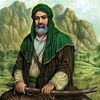 Ali
599 - 661
Ali
599 - 661
 Salima Murad
1900 - 1974
Iraqi Jewish singer and actress
Salima Murad
1900 - 1974
Iraqi Jewish singer and actress
 Tariq Aziz
1936 - 2015
Deputy Prime Minister and Foreign Minister
Tariq Aziz
1936 - 2015
Deputy Prime Minister and Foreign Minister
 Ali Hassan al Majid
1941 - 2010
Minister of Defense and Interior
Ali Hassan al Majid
1941 - 2010
Minister of Defense and Interior
 Mohammed Ghani Hikmat
1929 - 2011
Creating Baghdad's highest-profile sculptures
Mohammed Ghani Hikmat
1929 - 2011
Creating Baghdad's highest-profile sculptures
 Mahmud Shevket Pasha
1856 - 1913
Ottoman generalissimo and grand vizier
Mahmud Shevket Pasha
1856 - 1913
Ottoman generalissimo and grand vizier
 Sergio Vieira de Mello
1948 - 2003
UN High Commissioner for Human Rights
Sergio Vieira de Mello
1948 - 2003
UN High Commissioner for Human Rights
 Salim Al Basri
1926 - 1997
Playing Haji Radhi in Tahit Moos Al-Hallaq
Salim Al Basri
1926 - 1997
Playing Haji Radhi in Tahit Moos Al-Hallaq
 Saadi Youssef
1934 - 2021
Poet, journalist, publisher, translator
Saadi Youssef
1934 - 2021
Poet, journalist, publisher, translator
 Jamil Bachir
1920 - 1977
Oud player and teacher
Jamil Bachir
1920 - 1977
Oud player and teacher
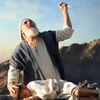 Ibrahim
-1996 - -1815
Prophet of God
Ibrahim
-1996 - -1815
Prophet of God
 Seta Hagopian
1950 - 2018
Singer and songwriter of Iraqi music
Seta Hagopian
1950 - 2018
Singer and songwriter of Iraqi music
 Faisal II of Iraq
1935 - 1958
Last King of Iraq
Faisal II of Iraq
1935 - 1958
Last King of Iraq
 Mohammed Oreibi Al Khalifa
1969 - 2021
Chief judge of the Al-Anfal trial
Mohammed Oreibi Al Khalifa
1969 - 2021
Chief judge of the Al-Anfal trial
 Al-Khalil ibn Ahmad al-Farahidi
718 - 786
Lexicographer
Al-Khalil ibn Ahmad al-Farahidi
718 - 786
Lexicographer
 Taufiq Wahby
1891 - 1984
Kurdish writer and army officer
Taufiq Wahby
1891 - 1984
Kurdish writer and army officer
 Shlomo Hillel
1923 - 2021
Speaker of the Knesset, Minister of Police
Shlomo Hillel
1923 - 2021
Speaker of the Knesset, Minister of Police
 Sabiha al Shaykh Da ud
1912 - 1975
Poet and activist for Kurdish language and culture
Sabiha al Shaykh Da ud
1912 - 1975
Poet and activist for Kurdish language and culture
We Need -- admin in

